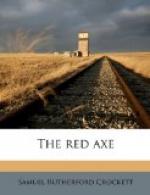“And remember,” said our Karl, as he embraced us, “that if ye return not on the eighth day at eventide, the forces of Plassenburg will e’en be battering on the gates of Thorn by the hour of dusk. I am not going to have my farms burned, my peasants disembowelled and cast to the blood-hounds, my women ravished in their kindly home-steadings. God wot! the cup of Duke Casimir hath been brimming this many a day, and we will give him a deep and bitter draught to drink when we set it to his lips.”
Thereupon we bade our dear and brave master a respectful adieu. Karl Miller’s Son he might be, but for all that he was every inch a king—a right royal man, whom I would rather serve than the Kaiser himself.
And after he had gone from us a little way he turned again and waved his hand, crying: “On the eighth day report you without fail, friends of mine, unless ye wish me to come asking for you at the gates of Thorn, with some din and the spilling of much blood.”
The worthy Abbot Tobias gave us a paper to the Bishop Peter, now restored to his bishopric of Thorn, and in some measure dwelling at peace with the Duke Casimir since that ruler’s reconciliation with Holy Church. In this paper it was set forth that the most learned Doctor of Law, Leonard Schmidt, with his servant Johann, were on their way to Ratisbon to dispute concerning the Practice of Law and Reason with another most learned Doctor of the Empire, and that, desiring to remain a day of two in Thorn, they were by the Abbot Tobias of Wolgast commended to Bishop Peter’s kind hospitality.
For indeed the inns of Germany, and especially of the North, were not at that time such as wise and learned men could readily submit to—neither abide in, to be herded with dull, landward peasants and all the tankard-swilling gutter-knaves of the town.
Of the remainder of our journey I need not speak, seeing that more than once I have had to tell of that journey from Thorn to Plassenburg. It is sufficient that by evening the dark, frowning mass of the Wolfsberg lay imminent before us, each tower black against the sky. For even the new portions which Casimir had builded were of intention blackened with soot—mingled with the plaster and mortar, so that they should be of one piece of grim terror with the rest of the building.
“After all it is not strange,” said I to the Councillor, for when there was no one in sight or very near us I rode with him instead of behind him, “that the man who shakes at every breeze among the aspens should take such pains to create the fiction and shadow of terror about him, when the substance and reality is dominant all the while in his own bosom.”
Since we had come within the distressed and depopulated territory of the Wolfmark we had not spoken to any soul. Indeed, except a few poor, desolate peasant folk, burned black with the sun, scuttling from den to den at the sight of mounted men, we had not seen any living creatures. The cruelty which had marked the reign of the Black Duke seemed to have afflicted the very face of the country with a visible curse.




